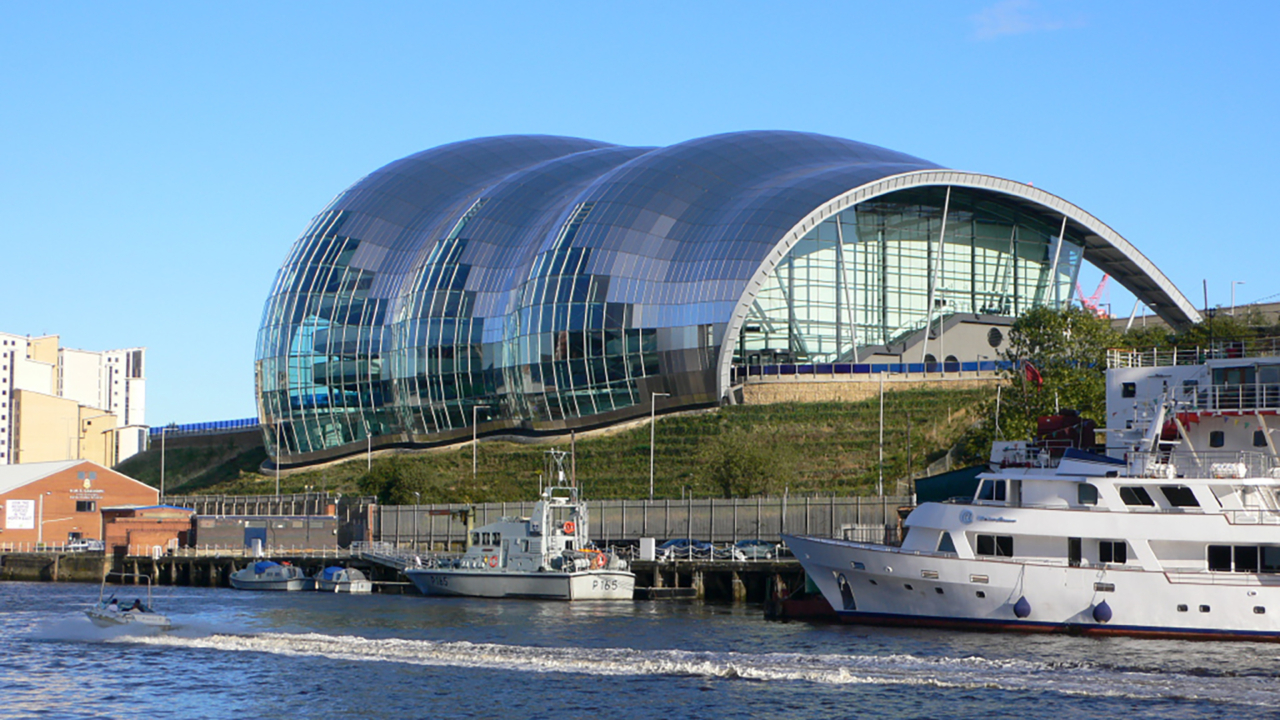- Posted on August 23rd, 2025
Story of Change: The Glasshouse

Future-Proofing Music: The Glasshouse’s Path to Net Zero
The Glasshouse, Newcastle is a music charity and performance venue, which is home to the Royal Northern Sinfonia. The building houses three main performance spaces, twenty music education rooms along with some cafes and bars. The venue hosts performances from a range of genres, such as pop and jazz, platforms for profiling local artists, as well as delivering education programmes for around 10,000 young people per week.
Background
The Glasshouse has a long track record of environmental action and have been measuring their carbon emissions since 2012. From 2018 onwards they joined the Arts Council England Spotlight programme, which supported them in embedding sustainability internally, and strengthened their approach to energy management, providing the groundwork needed for participating in the Capital Investment Ready programme. The Glasshouse has embedded sustainability into its policies, governance and action plans, with staff across the business contributing to different areas of its environmental strategy.
In 2018 the organisation completed a medium-sized capital project, which involved renovating concourse areas and converting seats in the main auditorium to be removable for larger, standing, gigs as the magnitude of their performances increases over time.
Building on Momentum
For The Glasshouse, joining the Capital Investment Ready programme felt like a natural next step to build on their efforts to reach their goal of becoming Net Zero by 2030. It was an opportunity for the organisation to take stock and review where they are on their journey. Joining the programme came at an opportune moment, with the organisation celebrating its 20th anniversary in 2024: an important milestone around which they are building a fundraising campaign. As a twenty-year-old venue, much of the equipment is original and at the end of its life. Combining this need to upgrade with their Net Zero ambition, The Glasshouse wanted to think to the future, keeping the environment at the heart of their plans to upgrade and future-proof their venue, rather than just fixing the ‘holes in the bucket’.
The programme has helped the organisation to work through the details of the capital investment element of their fundraising campaign. This helped them to make the distinction between basic upgrade needs, and where they need to stretch ambition to focus on decarbonisation and improving energy efficiency to meet their Net Zero goal. This differentiation has helped to secure donations towards the £10 million needed for their capital builds over the next ten years.
The Glasshouse is part of a local heat network, and also operates gas boilers, solar panels and a water heat pump. The Capital Investment Ready programme helped The Glasshouse to identify their highest areas of fossil fuel usage, which includes their commercial kitchen and the concert hall’s large dehumidifiers which stabilise the conditions for the orchestra’s wooden instruments. They plan to replace their still-original ducting management system and some of the plant room handling units and pumps, which they will upgrade to automate heating and cooling. They also identified other small assets that contribute to their carbon footprint, such as a forklift truck.
As part of the programme, access to expert support enabled The Glasshouse to calculate the payback time for a major solar project and to conduct a review of their energy-saving scheme submission.
The ‘Capital Case for Investment Template’ developed for the programme supported The Glasshouse to identify the data needed to build a case for support. The Glasshouse used the Pilio energy management tool to collate their energy data in one place, including electricity district, heat and gas, which made their data analysis and management easier.
Key Lessons
The programme has given The Glasshouse an opportunity to bring together different narratives they already have about their sustainability work; whether that is day-to-day maintenance or future-facing Net Zero plans. Balancing the carbon narrative with the financial narrative has been an important part of thinking through The Glasshouse’s approach to communication with different stakeholders, such as their Board and funders. The programme also supported them to better understand the priorities of different stakeholders, improving the effectiveness of their engagement with different audiences.
Being part of the programme has motivated colleagues, and strengthened the impact and reach of their anniversary funding campaign. So far, in six months they’ve raised a significant proportion of their half-a-million pound target for capital projects.
